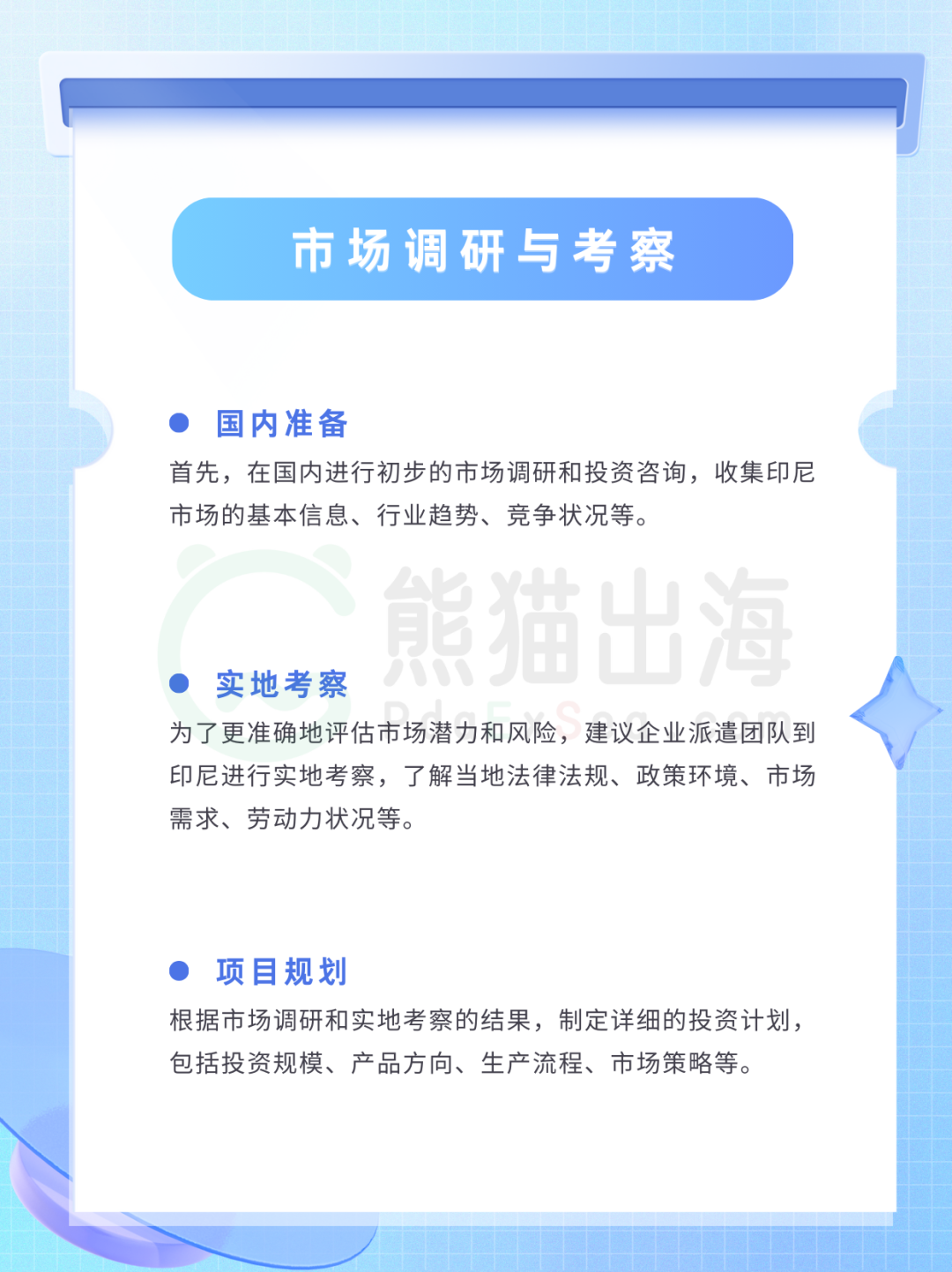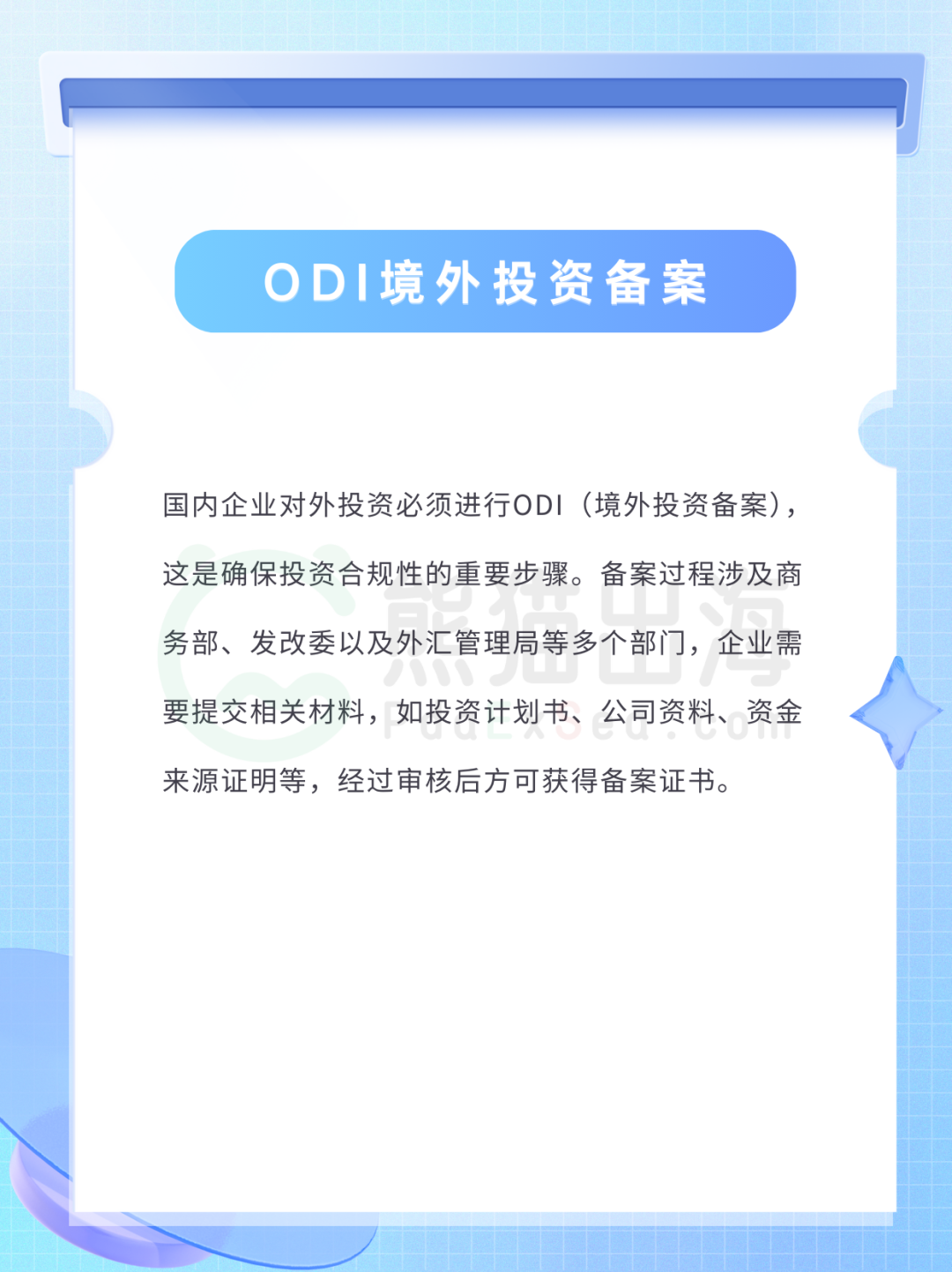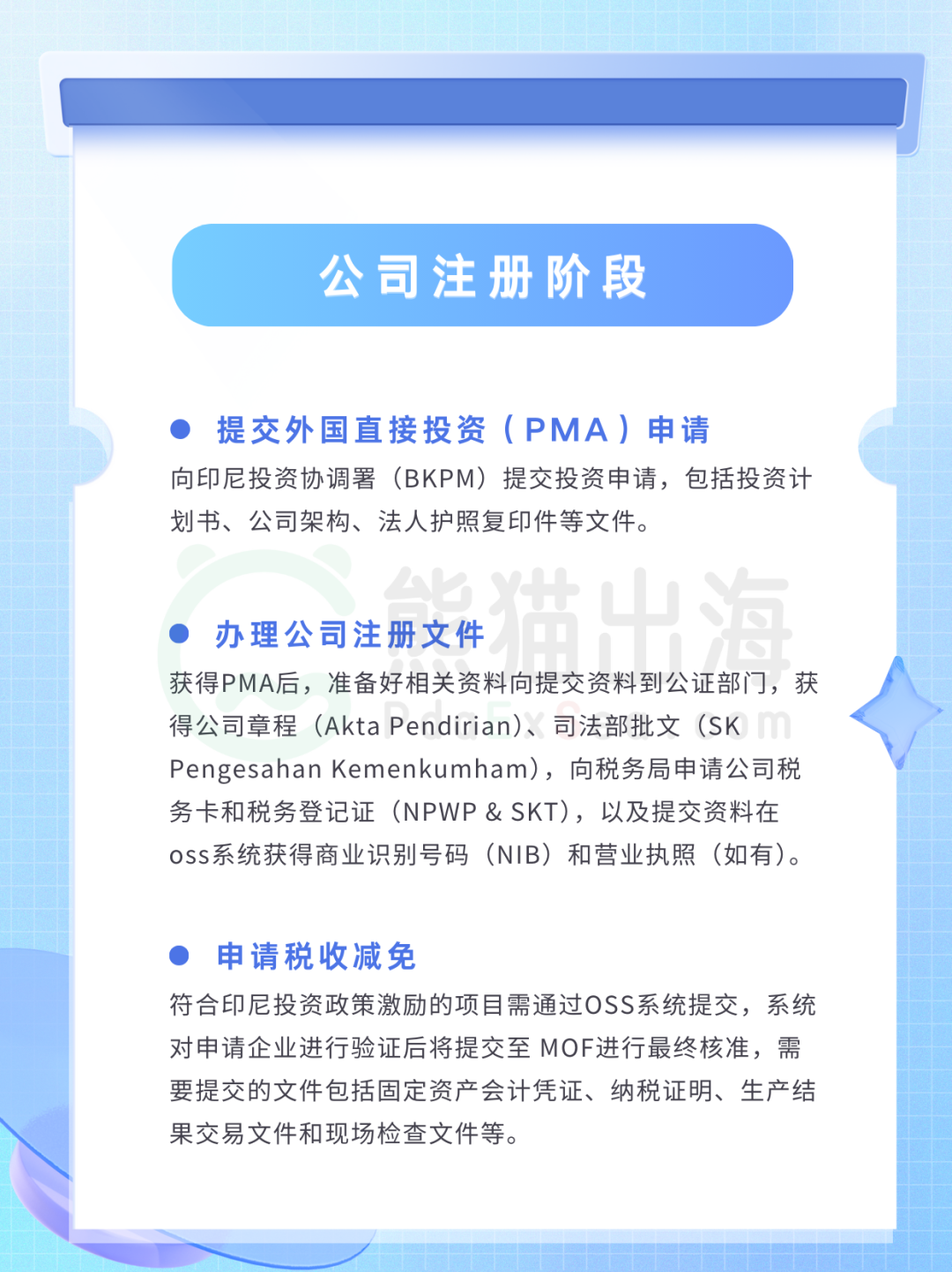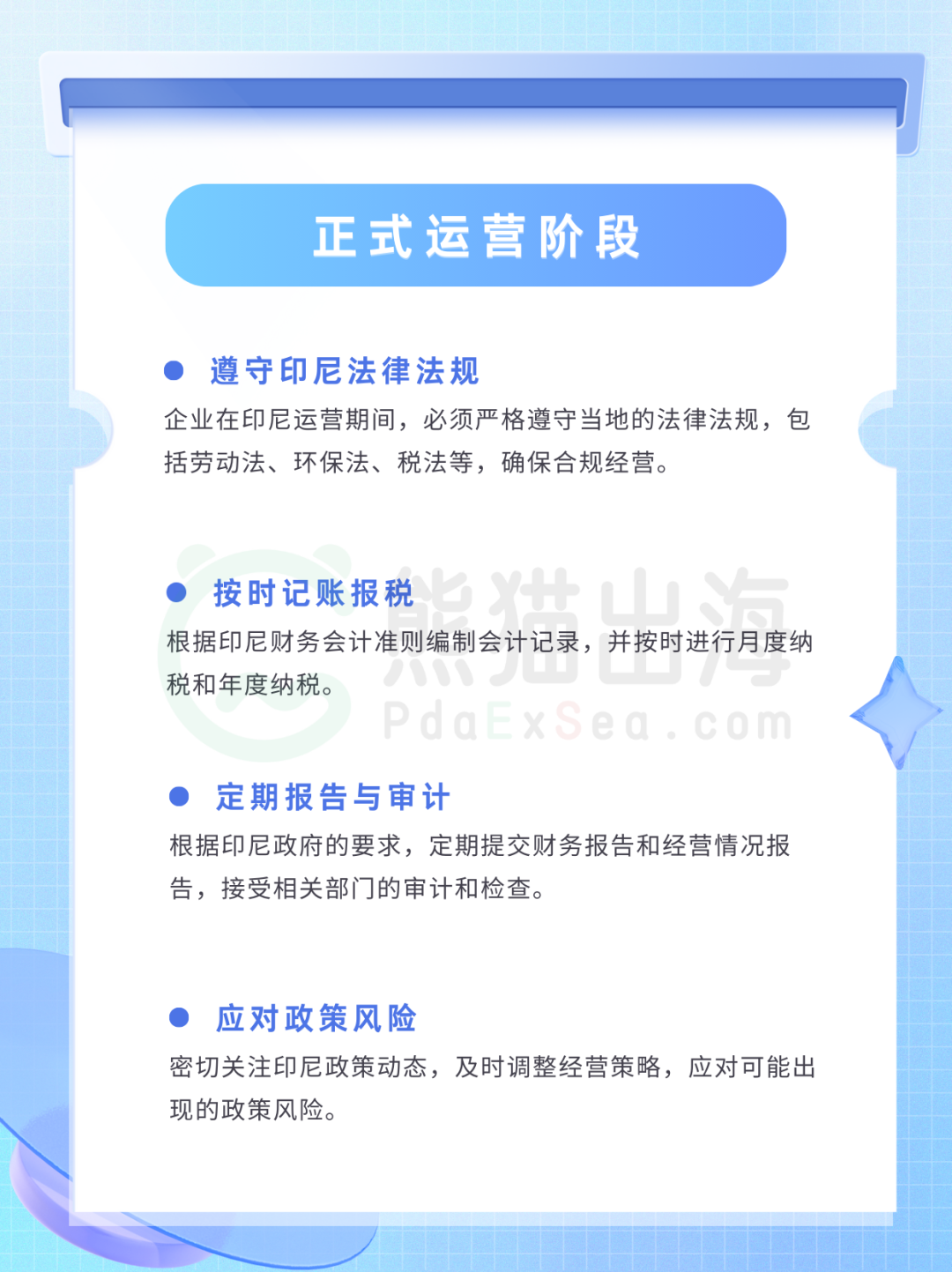The whole process of investing and building a factory in Indonesia
Investing in building a factory in Indonesia
2025-01-08 09:29:49
Page view:1571
1. Market Research and Investigation
Domestic Preparation
First, conduct preliminary market research and investment consultation in China to collect basic information, industry trends, competition status, etc. of the Indonesian market.
Field Investigation
In order to more accurately assess market potential and risks, it is recommended that companies send a team to Indonesia for field investigation to understand local laws and regulations, policy environment, market demand, labor status, etc.
Project Planning
Based on the results of market research and field investigation, formulate a detailed investment plan, including investment scale, product direction, production process, market strategy, etc.
Domestic Preparation
First, conduct preliminary market research and investment consultation in China to collect basic information, industry trends, competition status, etc. of the Indonesian market.
Field Investigation
In order to more accurately assess market potential and risks, it is recommended that companies send a team to Indonesia for field investigation to understand local laws and regulations, policy environment, market demand, labor status, etc.
Project Planning
Based on the results of market research and field investigation, formulate a detailed investment plan, including investment scale, product direction, production process, market strategy, etc.

Domestic enterprises must conduct ODI (Overseas Investment Registration) for overseas investment, which is an important step to ensure investment compliance. The registration process involves multiple departments such as the Ministry of Commerce, the National Development and Reform Commission, and the State Administration of Foreign Exchange. Enterprises need to submit relevant materials, such as investment plans, company information, proof of source of funds, etc., and can only obtain the registration certificate after review.

Submit a Foreign Direct Investment (PMA) Application
Submit an investment application to the Indonesian Investment Coordinating Agency (BKPM), including an investment plan, company structure, a copy of the legal person's passport and other documents.
Handle company registration documents
After obtaining the PMA, prepare relevant materials and submit them to the notary department, obtain the company's articles of association (AktaPendirian), the Ministry of Justice's approval (SKPengesahan Kemenkumham), apply for a company tax card and tax registration certificate (NPWP&SKT) from the tax bureau, and submit materials to obtain a business identification number (NIB) and business license (if any) in the OSS system.
Apply for tax relief
Projects that meet the incentives of Indonesia's investment policy must be submitted through the OSS system. After the system verifies the applicant, it will be submitted to the MOF for final approval. The documents that need to be submitted include fixed asset accounting vouchers, tax payment certificates, production results transaction documents and on-site inspection documents.

Factory site selection
There are three options: undeveloped land, land in industrial parks, and ready-made factories.
Land acquisition
Foreign capital must hold land use rights through an Indonesian company. It can choose to lease or purchase land and sign a lease or purchase contract.
Environmental assessment
Submit an environmental impact analysis report (AMDAL, outside the industrial park), environmental management and monitoring work (UKL-UPL, outside the industrial park), environmental management and monitoring plan report (RKL-RPLRINCI) or environmental management statement letter (SPPL) to the Indonesian Ministry of Environment according to the project situation. This is an important step before construction.
Apply for a building permit
Submit a building plan to the local construction bureau for the reconstruction or construction of a new factory, and apply for a building permit (PBG). If the factory is rented, the owner generally has obtained this permit.

Factory Construction
Construct the factory in accordance with the approved building plan and design drawings to ensure compliance with Indonesia's building regulations and safety standards.
Building Qualified Use Certificate (SLF)
Before the factory is completed and put into use, an SLF certificate must be obtained. After obtaining the PBG and SLF licenses, the company's business license can be activated as an industrial business license, and the factory can start production operations.
Equipment Procurement and Installation
Purchase production equipment, apply for import licenses (such as API-P), and install and debug.
Import License: For imported equipment and raw materials, applying for an import license can reduce tariffs and make customs clearance smoother.
Tax-free policy: Apply for Masterlist and SKBPPN to obtain an approval letter for VAT exemption for imported machinery.

Employee recruitment and training
Recruit local employees, apply for work permits (312 work visas) for Chinese employees, and provide production skills and safety operation training.
Apply for operating license
Apply for the Industrial Business Permit (Izin UsahaIndustri) and other necessary operating licenses from the Indonesian Investment Coordinating Agency.
Product certification
Apply for corresponding product certification (such as SNI, BPOM distribution license, etc.) according to the type of product produced.

Comply with Indonesian Laws and Regulations
During the operation in Indonesia, enterprises must strictly comply with local laws and regulations, including labor laws, environmental laws, tax laws, etc., to ensure compliance with regulations.
Timely accounting and tax returns
Prepare accounting records in accordance with Indonesian financial accounting standards, and pay monthly and annual taxes on time.
Regular reporting and auditing
Submit financial reports and operating reports regularly according to the requirements of the Indonesian government, and accept audits and inspections from relevant departments.
Dealing with policy risks
Pay close attention to Indonesian policy trends, adjust business strategies in a timely manner, and deal with possible policy risks.

For more details, please consult PDAEXSEA professional consultants.


